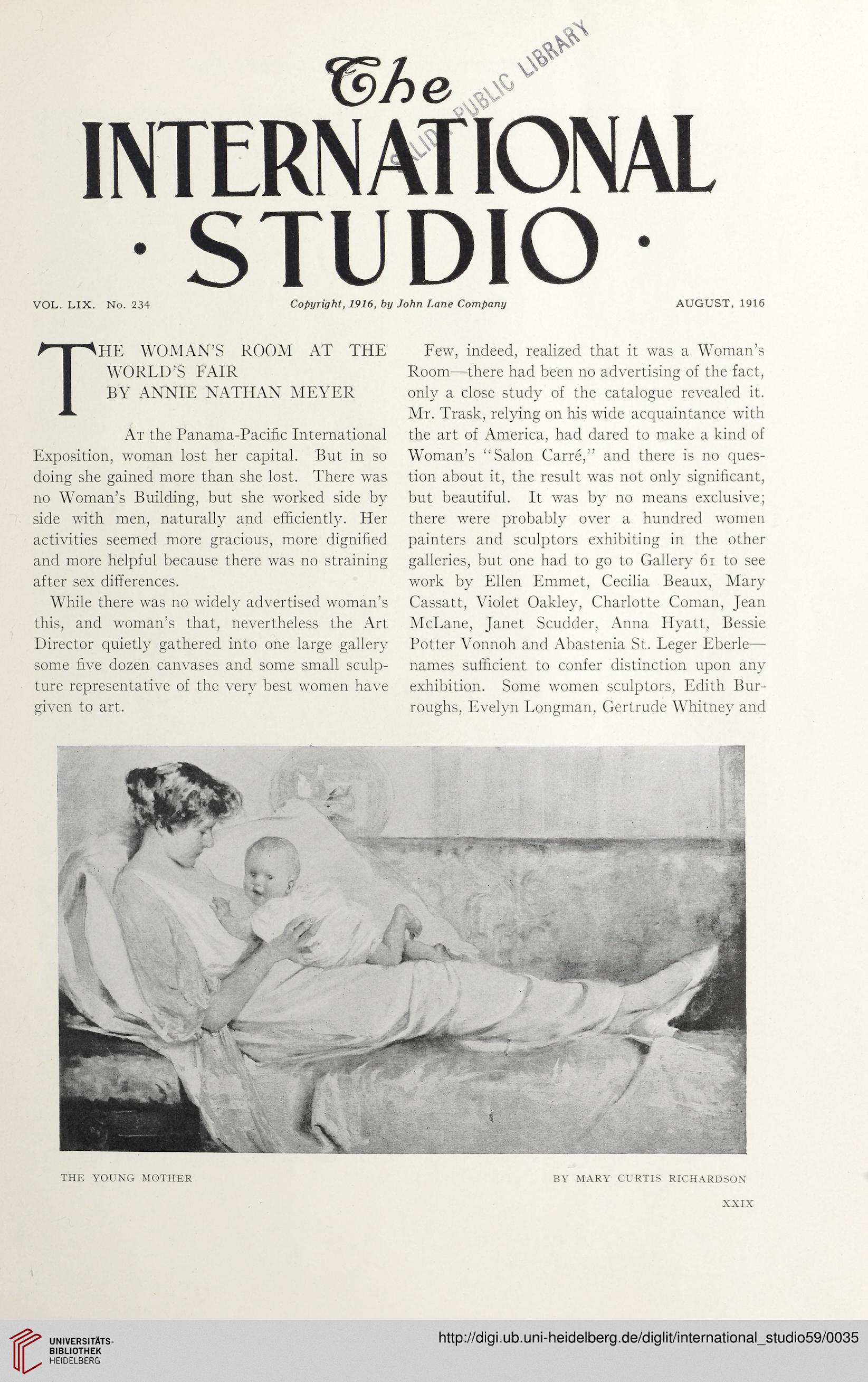AUGUST, 1916
Copyright, 1916, by John Lane Company
VOL. LIX. No. 234
INTERNATIONAL
• STUDIO
THE WOMAN’S ROOM AT THE
WORLD’S FAIR
BY ANNIE NATHAN MEYER
At the Panama-Pacific International
Exposition, woman lost her capital. But in so
doing she gained more than she lost. There was
no Woman’s Building, but she worked side by
side with men, naturally and efficiently. Her
activities seemed more gracious, more dignified
and more helpful because there was no straining
after sex differences.
While there was no widely advertised woman’s
this, and woman’s that, nevertheless the Art
Director quietly gathered into one large gallery
some five dozen canvases and some small sculp-
ture representative of the very best women have
given to art.
Few, indeed, realized that it was a Woman’s
Room—there had been no advertising of the fact,
only a close study of the catalogue revealed it.
Mr. Trask, relying on his wide acquaintance with
the art of America, had dared to make a kind of
Woman’s “ Salon Carre,” and there is no ques-
tion about it, the result was not only significant,
but beautiful. It was by no means exclusive;
there were probably over a hundred women
painters and sculptors exhibiting in the other
galleries, but one had to go to Gallery 61 to see
work by Ellen Emmet, Cecilia Beaux, Mary
Cassatt, Violet Oakley, Charlotte Coman, Jean
McLane, Janet Scudder, Anna Hyatt, Bessie
Potter Vonnoh and Abastenia St. Leger Eberle—
names sufficient to confer distinction upon any
exhibition. Some women sculptors, Edith Bur-
roughs, Evelyn Longman, Gertrude Whitney and
THE YOUNG MOTHER
BY MARY CURTIS RICHARDSON
XXIX
Copyright, 1916, by John Lane Company
VOL. LIX. No. 234
INTERNATIONAL
• STUDIO
THE WOMAN’S ROOM AT THE
WORLD’S FAIR
BY ANNIE NATHAN MEYER
At the Panama-Pacific International
Exposition, woman lost her capital. But in so
doing she gained more than she lost. There was
no Woman’s Building, but she worked side by
side with men, naturally and efficiently. Her
activities seemed more gracious, more dignified
and more helpful because there was no straining
after sex differences.
While there was no widely advertised woman’s
this, and woman’s that, nevertheless the Art
Director quietly gathered into one large gallery
some five dozen canvases and some small sculp-
ture representative of the very best women have
given to art.
Few, indeed, realized that it was a Woman’s
Room—there had been no advertising of the fact,
only a close study of the catalogue revealed it.
Mr. Trask, relying on his wide acquaintance with
the art of America, had dared to make a kind of
Woman’s “ Salon Carre,” and there is no ques-
tion about it, the result was not only significant,
but beautiful. It was by no means exclusive;
there were probably over a hundred women
painters and sculptors exhibiting in the other
galleries, but one had to go to Gallery 61 to see
work by Ellen Emmet, Cecilia Beaux, Mary
Cassatt, Violet Oakley, Charlotte Coman, Jean
McLane, Janet Scudder, Anna Hyatt, Bessie
Potter Vonnoh and Abastenia St. Leger Eberle—
names sufficient to confer distinction upon any
exhibition. Some women sculptors, Edith Bur-
roughs, Evelyn Longman, Gertrude Whitney and
THE YOUNG MOTHER
BY MARY CURTIS RICHARDSON
XXIX




